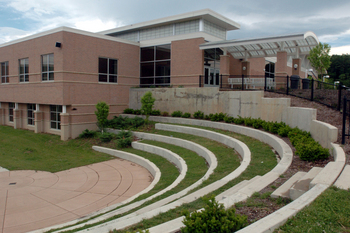On May 7, Washtenaw County voters will be asked to renew millages for several county schools, including districts in Chelsea, Dexter and Milan.
The districts are asking voters to renew millages that will generate funds for each of the district’s general operating budgets. The millages, all roughly 18 mills, will be levied on non-homestead property, including industrial, commercial and some agriculture property, as well as “second homes,” but does not tax a family’s primary residence. Official ballot language can be found on the Washtenaw County website.

Dexter is among districts asking voters to renew expiring school millages. Dexter High School is pictured in this file photo.
Proposal A changed the state’s tax laws in 1994, and among other things, required districts to levy an 18-mill tax on non-homestead property in their district to receive full funding, which must be approved by local voters.
In Milan, voters will be asked to renew a millage of 17.94 mills for 20 years from 2014-2033. The millage is expected to generate about $2 million per year, about 10 percent of the district’s budget.
An FAQ sheet on the millage provided by Milan Area Schools states that if the millage doesn’t pass, the district will be forced to reduce or cut programs to offset the loss, but Milan Board of Education President Chuck Bushart said the board hasn’t discussed what cuts would be made if the millage fails.
“Bottom line, kids come first in our community and the renewal of this millage is critical to our kids’ education,” he said.
In Chelsea, voters will be asked to authorize a millage of 19.51 mills, including the 18 mills recommended by the state to receive full funding plus 1.51 mills to offset any “Headlee rollback.” “Headlee rollbacks” occur when tax rates are reduced because property values are increasing faster than the rate of inflation. The inclusion of the additional 1.51 mills would allow the district to override the amendment to capture any lost funds.
The millage will renew 16.78 mills for seven years for 2014 through 2020 and an additional 2.83 mills for six years, from 2015 through 2020. It is expected to generate $3.5 million in its first year, about 14 percent of the school's budget.
Chelsea School District Superintendent Andrew Ingall said the millage is different than sinking funds, bond proposals or supplemental millages that support specific projects, because it directly affects the district's operating budget.
He said the district has already been reducing its budget in the past few years and a failure to pass the millage would result in a further budget reduction of 15 percent.
“We'd have to start some real serious conversations about what we're not going to do,” he said.
Dexter Community Schools is asking voters to pass two proposals. The first would reauthorize 18 mills, and the second would add a 3-mill “cushion” to offset a Headlee rollback. Both would be for 20 years from 2014 through 2033. The proposals are expected to generate $4.17 million in their first year, about 13 percent of the school's budget.
An FAQ sheet on the millage states that the district would be forced to reduce or cut programs to offset a loss of the millage, but Interim Superintendent Dennis Desmarais said that he would expect any district that doesn’t have the millage pass to put it up for vote again in the November election.
“However, significant cuts in personnel and programs would have to take place before the start of the 2013-2014 school year,” he said.
Plymouth-Canton Community Schools in Wayne County is also issuing a bond proposal to borrow $114.4 million for school facilities. The bond would be used to build a new middle school to replace Central Middle School, upgrade the district’s other schools, improve technology and replace older school buses.
Erica Hobbs is a freelance reporter. Contact the AnnArbor.com news desk at news@annarbor.com.